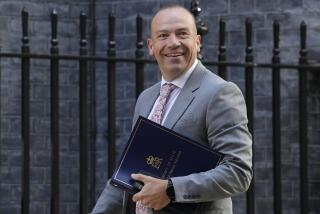Blair Wins Key Vote to Toughen Terrorism Law
- Share via
LONDON — The British House of Commons on Wednesday approved a toughened anti-terrorism law, with Prime Minister Tony Blair holding back rebels in his Labor Party to make the “glorification” of terrorism a crime.
The law’s passage took on added urgency for the government after protesters in London this month threatened violence in response to the publication of cartoons depicting the Muslim prophet Muhammad.
The opposition Conservative and Liberal Democratic parties opposed the government’s draft of the bill, saying it was too broadly written and infringed on freedom of speech.
The House of Lords had taken out language making “glorification” of terrorism a crime in the version it approved, but Blair and Home Secretary Charles Clarke argued that putting it back would send a tough message to terrorism sympathizers.
“Weakening our law on terrorism at this time from what is proposed will send the wrong signal out to the outside world,” Blair said before the 315-277 vote.
He said any retreat by the government would “do no service to those people in our police and law enforcement who are anxious to get on with the job of prosecuting people.”
In the end, only 17 Labor members joined with the Conservatives and Liberal Democrats to vote against the legislation.
Despite its earlier opposition, the House of Lords is expected to defer to the more powerful House of Commons when it takes up the measure again. The two chambers must reach agreement for it to become law.
William Hague, who served as spokesman for the Conservatives during debate, accused Blair of “ineffective totalitarianism” and said it was only a “press release law designed to catch the headlines.”
The legislation comes as Britain struggles to find the right balance between its traditional liberties and the increased threat of terrorism. It also reflects concern that some of the country’s Muslim citizens could be recruited to stage attacks on British soil, as with last summer’s bombings of London’s transit system.
Blair had argued that the broader language in the bill would ban a wider range of speech that could inspire terrorist acts.
Opponents of the bill said existing laws that prohibit incitement to commit violence were adequate to cover the crime the government meant to address. The government’s draft, they charged, was an overly emotional response that could restrict expression of support for legitimate causes, such as advocating the overthrow of dictatorships.
“This is a bogus spat generated by 10 Downing Street for the purpose of the prime minister looking tough,” said Dominic Grieve, the Conservatives’ shadow attorney general, speaking to the BBC.
During debate over the legislation, critics cited Britons who had supported the African National Congress in its battle against apartheid, and activists now urging the overthrow of Zimbabwean President Robert Mugabe.
A human rights lawyer, Geoffrey Bindman, told the Guardian newspaper that the government wanted “a law that can be used prosecuting anyone who says anything favorable about terrorism. But that becomes a very dangerous inroad on freedom of speech.”
“People may wish to express views about a repressive regime which may involve suggesting that ultimately it may be necessary to use violence to bring an end to that regime,” Bindman said. “That seems to me a perfectly respectable thing to do.”
Even without the toughened language, Abu Hamza al Masri, Britain’s best-known militant Islamic preacher, was sentenced last week to seven years in prison. The court ruled that his teaching included solicitation of murder and incitement to terrorist violence.
Britain’s anti-terrorism law, originally enacted to address Irish nationalist violence, has been toughened twice in the aftermath of the Sept. 11 attacks in 2001. But Blair promised even stricter provisions after last year’s attack on the transit system, when four suicide bombers killed 52 commuters.
In place of the “glorification” provision, the House of Lords had proposed making “indirect incitement” an offense. Members argued that was more precise than “glorification,” which was seen as subject to interpretation by prosecutors and judges.
More to Read
Sign up for Essential California
The most important California stories and recommendations in your inbox every morning.
You may occasionally receive promotional content from the Los Angeles Times.










